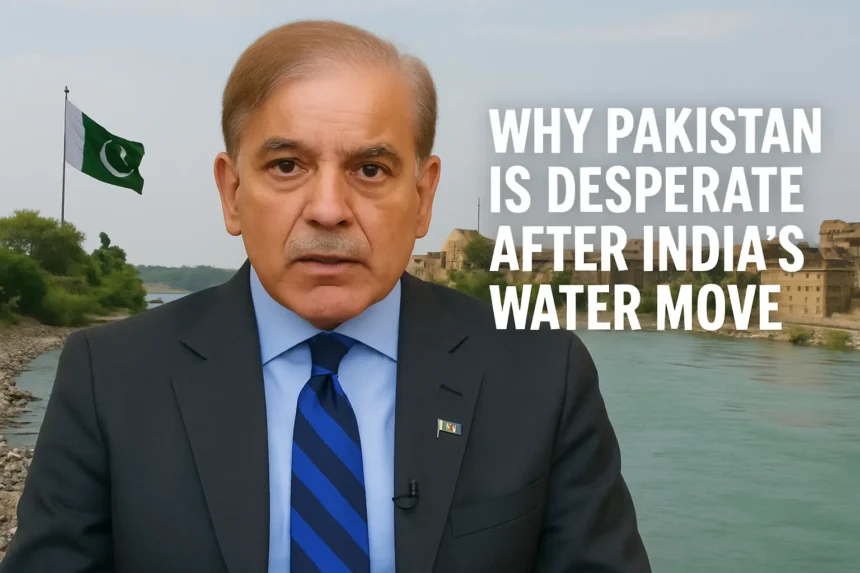Why Pakistan Is Desperate After India’s Water Move
In a dramatic political twist, Pakistan Prime Minister Shahbaz Sharif‘s recent statements from Iran have sent shockwaves across South Asia. With India postponing the Indus Water Treaty—a historic agreement that has survived wars and political hostilities—Pakistan finds itself gasping for every drop of water. And now, with a parched throat and a shaky voice, Sharif says, “We are ready to talk.”
But India’s message is loud and clear: There will be no talks unless it’s about Pakistan-occupied Kashmir (POK) and terrorism.
Let’s break down the shocking developments—and why Shahbaz Sharif’s Iran visit exposed Pakistan’s desperation like never before.
1. Indus Water Treaty Postponement: A Strategic Masterstroke by India
The Indus Water Treaty, signed in 1960, allowed both nations to share the waters of the Indus river system. But with Pakistan continuing its support for terrorism and anti-India propaganda, the Modi government finally decided to suspend cooperation.
This move hit Pakistan hard. Water, already scarce in the region, is essential for agriculture, drinking, and hydroelectric power. And with this treaty now hanging by a thread, Pakistan is facing an unprecedented crisis.
2. PM Modi’s Stern Warning: “Not a Drop of Water for Terrorists”
Last week in Rajasthan, Prime Minister Narendra Modi minced no words. Addressing a massive rally in Bikaner, he said:
If Pakistan continues to bleed India with terror, they won’t get a single drop of our water.
This wasn’t just a statement—it was a geopolitical red line. No more tolerance. No more talks unless terrorism stops and POK is returned.
Modi’s tone reflected the anger of a nation that has lost thousands of lives to Pakistan-sponsored terrorism.
3. Shahbaz Sharif’s Cry for Dialogue in Tehran: A Diplomatic Breakdown
In an almost pleading tone, Pakistan PM Shahbaz Sharif, standing beside Iranian President Masoud Pezeshkian, said in Tehran on May 26, 2025:
Pakistan is ready to resume talks with India.
But instead of sounding strong, Sharif came off as cornered and helpless. His call for dialogue was clearly not coming from a place of strength—but from dire necessity.
Observers noted how Iran’s neutral stance only further isolated Pakistan. Even regional allies are wary of supporting a state tied to instability.
4. Operation Sindoor and Its Fallout: A Wake-Up Call for Pakistan
India’s recent Operation Sindoor—an unconfirmed but viral military operation against terror camps in Pakistan-occupied territories—has reportedly left Pakistan reeling.
While official sources remain tight-lipped, media reports suggest precision strikes aimed at eliminating terror breeding grounds. These actions combined with the water standoff, have left Pakistan with little room to maneuver.
And now, from international isolation to internal chaos, Islamabad’s political class is looking for a lifeline.
5. India’s Final Word: No Talks Without POK on the Table
External Affairs Minister S. Jaishankar echoed PM Modi’s sentiments:
We will talk to Pakistan only on one subject—Pakistan-occupied Kashmir.
This firm stance signals a major shift in India’s foreign policy doctrine: No more appeasement. No more distractions. It’s POK or nothing.
India is making it clear to the world that it won’t compromise on national security, water rights, or its territorial integrity.
What This Means for South Asia
This entire episode marks a paradigm shift in Indo-Pak relations.
- Pakistan is desperate for water.
- India is unwavering in its stance on terrorism.
- The world is watching as tensions rise—but New Delhi isn’t blinking.
For the average citizen in Pakistan, this could mean more power shortages, food insecurity, and even civil unrest. Meanwhile, India’s tough love diplomacy is earning it praise globally.
Final Thoughts: When Water Becomes a Weapon
Shahbaz Sharif’s appeal in Iran goes beyond mere diplomacy—it signals Pakistan’s growing vulnerability amid escalating regional tensions. India’s decision to suspend the Indus Water Treaty has transformed water from a shared resource into a powerful tool of strategic pressure. As a result, Pakistan, already grappling with economic instability and diplomatic isolation, finds itself in a desperate position. While Sharif calls for renewed dialogue, India remains resolute—talks will only happen on terrorism and Pakistan-occupied Kashmir.
The critical question remains: will Pakistan shift its policies, or is this just another recurring chapter in the complex and often hostile Indo-Pakistan narrative?
Curious about India’s next move in the Indus Water war?
Stay tuned to TN HEADLINES24 for bold, honest, and deeply-researched insights.
Don’t forget to follow for more updates on India-Pakistan relations, defense strategies, and geopolitical power shifts.
Most read: https://tnheadlines24.com/st-martins-island-in-danger-hasinas-bold-claim/
Also read: https://tnheadlines24.com/hurdles-balochistan-faces-to-become-a-nation/
Disclaimer: The views and statements expressed in this article are based on publicly available sources and do not necessarily reflect the official stance of TN HEADLINES24. TN HEADLINES24 is not responsible for the accuracy, completeness, or reliability of any information provided herein. Readers are advised to verify facts independently and use their discretion while interpreting the content.

